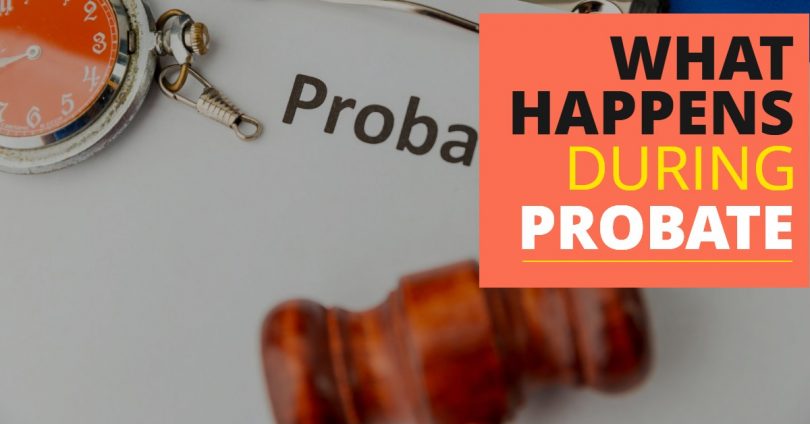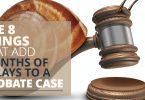Through probate, the court can ensure that a deceased’s final wishes are fulfilled and their assets allocated to their rightful beneficiaries. The process involves locating all of the person’s possessions, verifying values, settling debts and taxes due – ensuring both legal correctness and fairness in estate allocation.
When is it necessary to go through the probate process?
The probate process is often necessary to settle an estate and cover the decedent’s final expenses. Although laws directing this process vary from state-to-state, each requires certain requirements for processing a will or intestate succession when no will exists. Regardless of whether there is a written document in place, it is important to understand what must be done according to respective Probate Codes in order ensure all matters are handled appropriately.
Validating the final will and testament
After the passing of a loved one, state laws require that their will be filed with the probate court in a timely fashion. Taking into account this emotional time for families, many states have provided forms to simplify filing an application or petition to open up probate on the estate which may include submitting death certificates and wills.
When a decedent leaves behind a will, the probate judge must affirm its validity. This process may include organizing a court hearing—giving all beneficiaries and potential heirs ahead of time notification that this is taking place. In some cases, objections to the contents or execution of the will may be made during these hearings; for example if newer wills have been found which contradict what had already been presented to the courts or someone challenges who has been named executor in charge of handling assets from an estate.
The court relies on a range of methods to verify the authenticity of wills, such as self-proving affidavits. This document helps ensure that witnesses have seen and signed off on an individual’s last testament at the time it was made. If this is not available, however, further testimony may be required from one or more of these same witnesses in order for courts to validate its validity.
Appointing an executor or a personal representative
Upon the decedent’s passing, a court-appointed executor will be responsible for settling their estate and overseeing its probate process. This individual may have been chosen in the deceased’s will or if no such selection was made, then next of kin is typically appointed by the court to this role instead. However, they are at liberty to decline it should they choose; allowing for alternate arrangements on behalf of that party involved with administering said estate. The nominated executor shall receive “letters testamentary” which acknowledges them as authorised forces able to make transactions legitimately during these processes – otherwise known under other titles such as ‘Letters of Authority’ or even ‘Letters of Administration’.
Posting a bond
The requirement for an executor to post a bond may vary by state and circumstances, with certain independent individuals nominated in the will being exempt from this formality. In other states or cases where there is no exemption, beneficiaries must unanimously agree that such a measure isn’t necessary. A bond serves as protections against any misstep taken by the executor which could financially impact those benefitting from the estate’s assets.
Finding the assets of the deceased
As executor, your first duty is to find and secure all of the decedent’s assets. This requires diligence as sometimes even a spouse may be unaware of some estate investments or holdings that need safeguarding during probate proceedings. To uncover any overlooked properties on paper, go through insurance policies, tax returns – anything related to finances could hold invaluable information for the task at hand!
The executor of an estate must make sure taxes, insurance and mortgage payments are taken care of to ensure that assets such as the property itself do not suffer loss – while also collecting statements or other materials associated with investments like stocks or bank accounts. They may even be responsible for securing any collectibles which could have great monetary value should they end up in the wrong hands.
Establishing the value of assets on the date of death
In order to arrive at the correct date of death value for a decedent’s assets, thorough account statements and appraisals may be necessary. Depending on state regulations, an executor can either pick their own appraiser or have one appointed by the court. Ultimately, final confirmation is provided through a written report submitted to the court which outlines every asset owned as well as how its respective value was calculated.
Identifying and informing creditors
As executor of the estate, it is your responsibility to identify and inform creditors of their legal rights under state law. To ensure any unknown parties are notified, many states require publication in a local newspaper detailing the decedent’s death. Creditors will typically have an allotted period following receipt of this notice to submit claims for outstanding balances owed by the individual – though exact time frames may vary depending on jurisdiction regulations. In instances where validity doubts arise about such requests, you can take steps to reject them before referring matters over for judicial determinations from probate court as necessary.
Settling the debts of the deceased
The executor of an estate is responsible for ensuring all the decedent’s debts and final bills are handled in a timely manner. Using funds from the estate, they will settle any valid creditor claims to ensure their obligations are fulfilled.
Creating and submitting tax returns
The executor of the estate is responsible for filing all necessary personal and/or estate tax returns in order to ensure liability remains manageable. Should those taxes be due, it may become necessary to liquidate assets from the decedent’s portfolio, as such payments must generally be made within nine months of their passing.
Distributing the estate assets
Upon completing all the required steps, the executor can apply to a court for permission to transfer and share out any remaining assets of the decedent’s estate among his named beneficiaries. With some states permitting collective waiver of this accounting requirement if agreed unanimously by all concerned parties, it is essential that an exhaustive record be kept—listing each expenditure from and income earned on behalf of the deceased’s estate—in order for courts to approve distribution. Luckily there are various forms available in certain jurisdictions which make cataloguing these transactions much simpler.
Executors have an important role in dealing with property bequests to minors, as they must set up a trust to ensure that these assets are protected. For adult beneficiaries, transfer documents need to be prepared and submitted officially for the will’s directives regarding inheritance of possessions to take full effect.
Intestate estates
When a decedent fails to leave behind a valid will, their estate becomes intestate. This means that instead of being distributed according to the deceased’s wishes, assets are passed on based upon laws set by each respective state. In this scenario familial relatives become heirs who inherit property in an order determined by legal statutes and parameters.
As you make decisions regarding Estate Planning matters, it is important to draw on the expertise of a licensed attorney who specializes in the laws of your state. This article should not be seen as an alternative source for legal advice.




